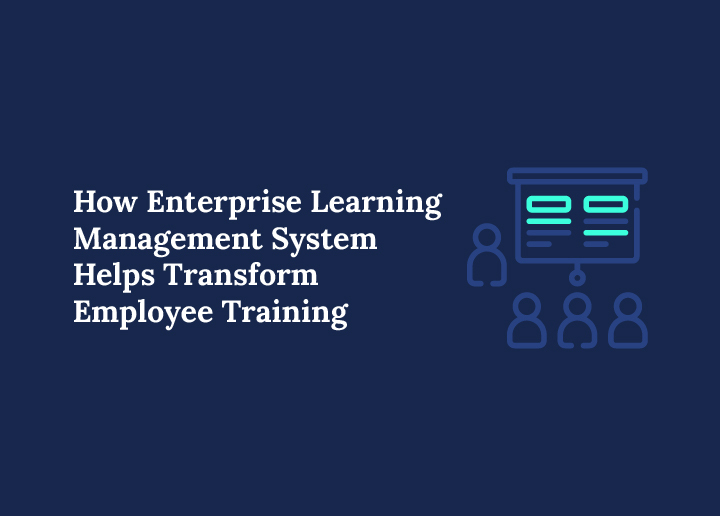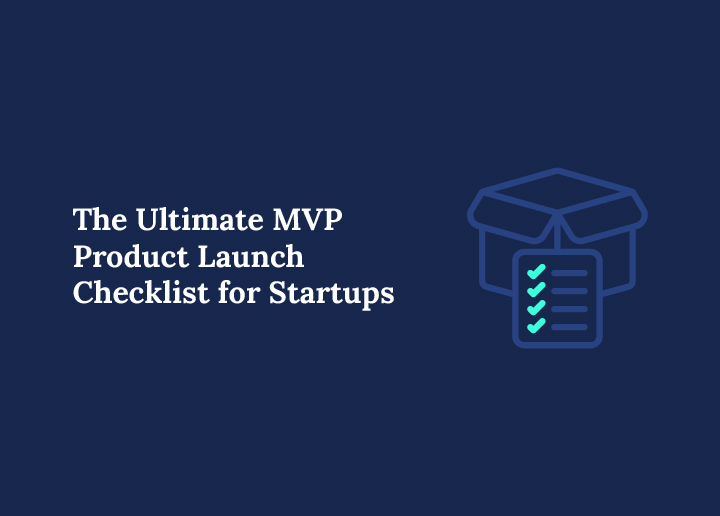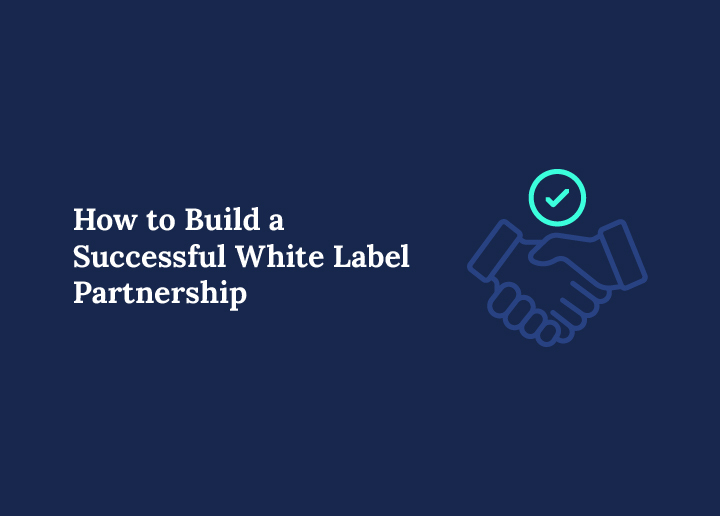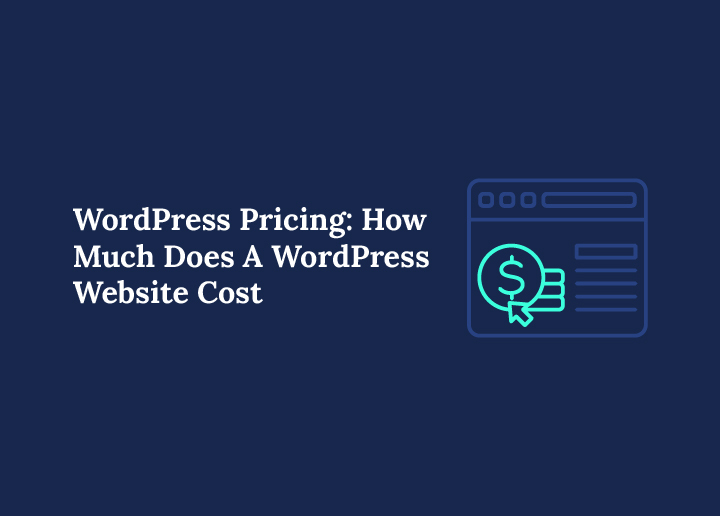Enterprise learning is the systematic approach organizations use to consistently and effectively develop team members, partners, and customer knowledge. An enterprise learning management system (LMS) is central to this transformation. It supports corporate learning initiatives, offering a single platform to deliver online courses, monitor learner progress, and manage compliance training and course creation.
With a modern enterprise LMS, organizations move beyond fragmented training methods such as email links, in-person workshops, or scattered PDFs. Instead, they deliver a seamless learning experience that supports operational efficiency, customer satisfaction, and better business outcomes. Whether onboarding new hires or reskilling seasoned employees, enterprise learning management ensures learning is engaging, measurable, and aligned with organizational goals.
Key Features of an Enterprise Learning Management System
A robust enterprise learning management system goes beyond simple content delivery. It provides a flexible, scalable foundation for managing training programs across departments, locations, and learner types.
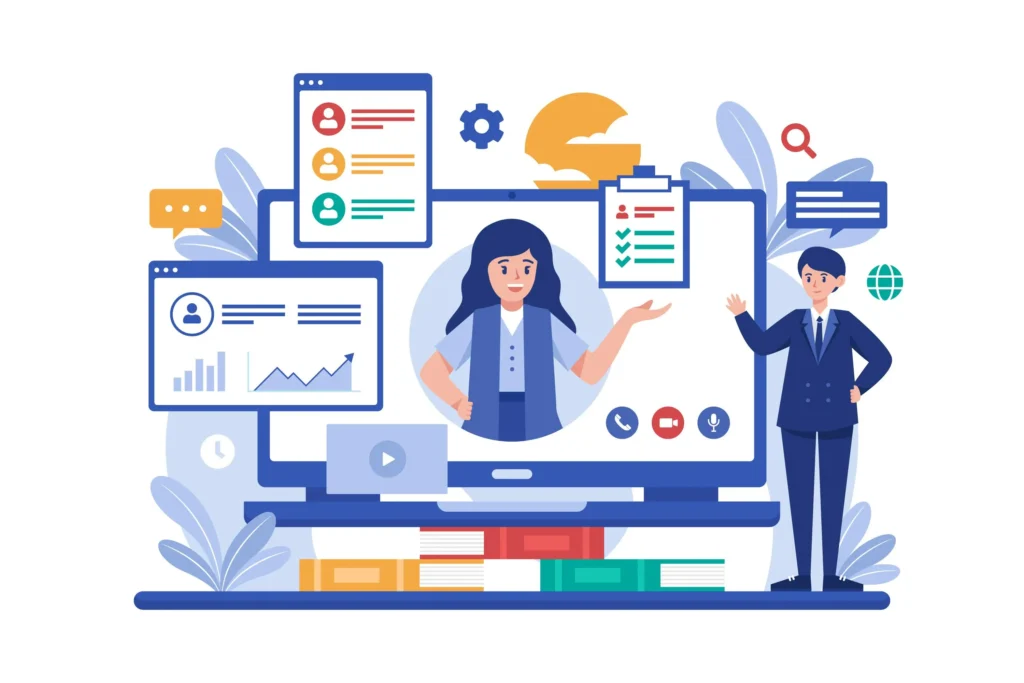
Course Creation & Course Content Management
A comprehensive enterprise Learning Management System offers built‑in authoring tools and templates to create courses and custom training materials directly within the system. Version control ensures content updates are tracked, and automated updates keep learners on the latest materials. This streamlines course creation, reducing reliance on external tools and ensuring content consistency.
Also Read: Best Course Management Systems & Platforms
Scalable Training & Integration with Existing Systems
Cloud‑based LMS platforms are built for scale. Whether rolling out compliance training to thousands worldwide or launching new sales training modules, enterprise Learning Management System solutions manage high volumes of users without compromising performance.
They integrate with HRIS, CRM, ERP systems, and single sign‑on tools, making training part of existing workflows. This allows learning to be seamless and embedded in daily operations while integrating with existing tools used by the organization.
Mobile Learning
Mobile learning ensures employees can access e‑learning courses anytime and anywhere on laptops, tablets, or smartphones, which can also benefit training customers. Offline availability allows frontline workers in remote environments, such as manufacturing or retail, to complete training without constant connectivity.
Compliance Training & Certification
Compliance training modules help organizations meet external regulations and internal policy standards by utilizing robust analytics to track compliance. Enterprise learning management systems track mandatory courses, issue reminders for renewals, and store completion records. This automation reduces risk and ensures audit readiness.
Advanced Analytics & Progress Tracking
Robust analytics dashboards provide actionable insights into key metrics like completion rates, engagement levels, time‑to‑competency, and skills gaps. Adaptive reporting lets administrators segment data by team or location and measure ROI on training efforts. These insights enable data‑driven decision-making and continuous optimization of the learning strategy.
Social Learning & Collaborative Features
Social learning features like forums, discussion boards, wikis, and group workspaces encourage peer‑to‑peer knowledge sharing. Collaborative learning boosts engagement, helps reinforce learning, builds a community culture, and introduces innovative features such as gamification. Gamified elements such as badges, leaderboards, and point systems make training more motivating and enjoyable.
Security, Encryption & Data Integrity
Enterprise Learning Management System platforms employ industry‑standard security protocols, rest and transit encryption, firewalls, and access controls. Administrators have granular control over user roles and permissions. Many platforms comply with SOC 2, GDPR, or HIPAA regulations, safeguarding operational data and learner privacy.
Ready to Elevate Your Enterprise Learning Management System?
Partner with Seahawk to ensure your LMS runs securely, efficiently, and always stays ahead of the curve.
Advanced Analytics and Reporting
Advanced analytics are foundational to the success of corporate training. An enterprise learning management system allows businesses to make data-driven decisions directly impacting learner progress and business outcomes. With built-in tools, robust analytics, and reporting features, enterprise LMS software transforms raw data into strategic insights.
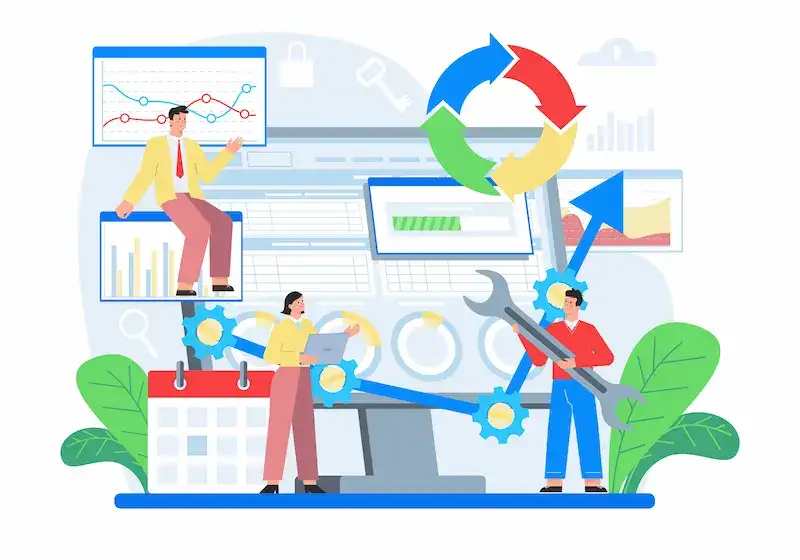
Enterprise Learning Management System platforms offer:
- Customizable dashboards showing learner engagement, learning paths, course completion rates, and performance across training programs
- Automated reporting tools with scheduled delivery options for managers, HR teams, and compliance officers
- Integration with BI, HR, and CRM systems to enable cross-functional insights and improve alignment with broader organizational goals
- Predictive analytics helps identify at-risk learners, refine learning content, and improve team member training outcomes.
Organizations gain actionable insights by leveraging reporting functionalities and robust analytics to evolve their learning strategy. These features support continuous improvement within the learning platform, help reallocate resources effectively, and justify training investments using measurable, real-world metrics. The result is more brilliant, scalable training that meets the demands of enterprise businesses in real time.
Also Read: Best LMS Development & Maintenance Companies
Compliance Training and Regulatory Adherence
Compliance training is not just a checkbox activity. It is legally necessary for enterprise companies in healthcare, finance, government, and manufacturing industries. A comprehensive LMS enables organizations to manage compliance training efficiently while reducing risk and improving operational efficiency.
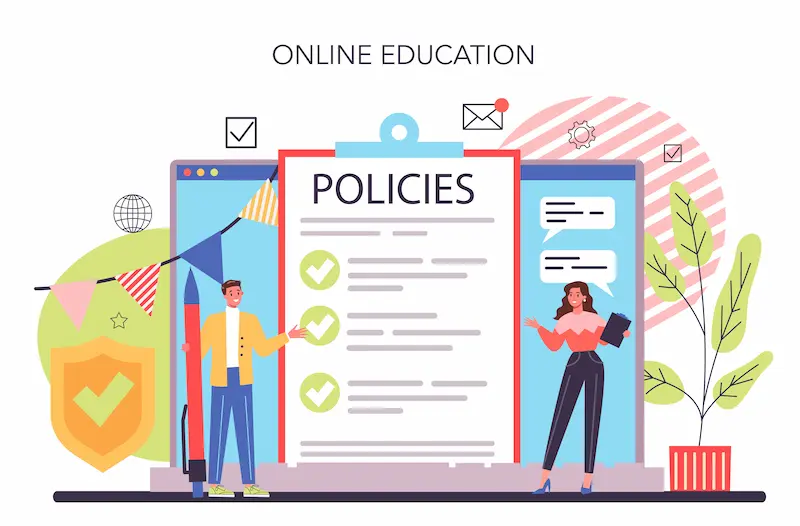
A modern training management system can:
- Schedule mandatory compliance training courses based on roles, departments, or legal requirements
- Automatically trigger re-certification reminders and alerts before deadlines
- Track, manage, and store certification status, training history, and expiration dates for easy reference
- Generate audit-ready reports to satisfy external regulators and internal audits with minimal manual effort
Businesses use an enterprise Learning Management System for compliance training to ensure every team member aligns with current industry regulations and internal policies. It also provides accountability across departments, reduces the chance of non-compliance penalties, and builds a culture of continuous learning.
The ability to deliver learning through mobile learning options and track progress in real time makes enterprise LMS platforms essential tools for regulatory adherence, particularly in team member training.
Collaborative Learning and Engagement
Collaborative learning is vital in creating a dynamic and engaging learning environment. A modern enterprise learning management system empowers organizations to promote team-based learning and knowledge sharing through built-in tools that boost learner engagement and retention.

Key features that support collaborative learning include:
- Social learning features: Integrated forums, shared workspaces, and discussion boards allow learners to interact, ask questions, and share insights in real-time.
- Peer feedback tools: Group assignments, collaborative projects, and peer evaluations encourage teamwork and provide diverse perspectives on training content.
- Gamification: Elements like badges, rewards, and competitive leaderboards inspire healthy competition and keep learners motivated throughout their training courses.
Enterprise Learning Management System platforms use collaborative tools to help learners feel more connected, increasing participation and accountability. Engaged learners are more likely to complete training programs, retain knowledge longer, and apply what they have learned in real-world work scenarios. These engagement strategies improve learner outcomes and strengthen the corporate learning culture across enterprise businesses, especially when the LMS is user-friendly.
Customer Education and External Training
Enterprise learning management systems are not just built for internal team member training. They are also powerful tools for delivering external training programs and customer education initiatives. These features are essential for enterprise companies that aim to improve product adoption, reduce onboarding time, and build long-term customer loyalty.
An enterprise Learning Management System supports customer education with capabilities such as:
- Customizable branding and e-commerce features: Deliver a branded, user-friendly experience that aligns with your company’s identity and supports payment processing for online courses.
- Automated enrollment and certification management: Ensure seamless access to training content and verify completion through certificates and progress tracking.
- Scalable delivery to partners and clients: Offer consistent and reliable training experiences across multiple locations and user groups without compromising quality.
By leveraging enterprise LMS solutions to train customers, organizations can deliver learning experiences that reduce the need for ongoing customer support, shorten the learning curve, and ensure clients stay compliant with industry regulations. Whether offering product tutorials, sales training, or compliance training, these systems help enterprise businesses improve customer satisfaction, enhance retention, and ultimately drive better business outcomes.
Corporate LMS Solutions and Implementation
Enterprise Learning Management System solutions are the backbone of modern team member training and development. Implementing a corporate learning management system requires a strategic and structured approach to ensure alignment with business objectives and training goals.
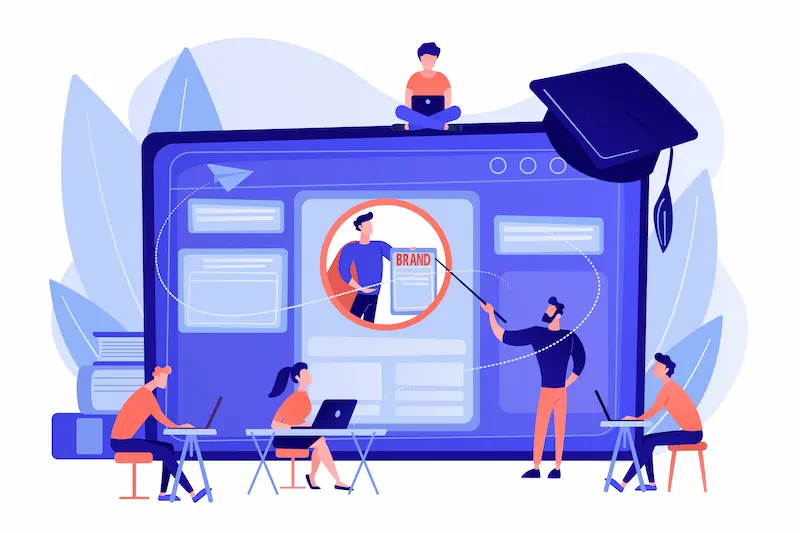
Successful implementation involves:
- Conducting a learning needs assessment to identify skill gaps, align training efforts with business outcomes, and ensure the LMS supports team member training, compliance training, and customer education.
- Achieving stakeholder alignment by involving HR, IT, compliance officers, department heads, and leadership to ensure the enterprise LMS integrates with existing systems and meets cross-functional needs.
- Streamlining technical integration with core enterprise tools such as HR systems, CRM, SSO, and other existing tools for a seamless learning experience.
- Launching a phased rollout that starts with pilot groups to test functionality, gather feedback, and fine-tune training content before scaling.
- Encouraging adoption through learning ambassadors, internal champions, and clear communication on how the LMS improves career development and corporate training.
- Providing ongoing support through dedicated help desks, online tutorials, and training programs to boost user confidence and system adoption.
- Monitoring usage trends and system health with reporting tools and advanced analytics to evaluate engagement levels, identify barriers, and optimize learning paths.
By thoughtfully implementing a cloud-based LMS, enterprise companies can improve operational efficiency, deliver learning at scale, and enhance team member onboarding and training outcomes.
Explore Further: B2B Enterprises Vs B2C: How Website Strategy Changes and Why It Matters
Enterprise Learning Management System Administration
Effective administration is essential to maximizing the value of an enterprise learning management system (LMS). Skilled LMS administrators ensure that the platform supports corporate learning goals and functions efficiently for all users, including employees, partners, and customers.
Key responsibilities include:
- Managing user roles and permissions, defining access controls, and organizing users into departments or training groups for scalable training delivery.
- Setting up dashboards and tracking tools to monitor key metrics such as learner progress, engagement, course completions, and training effectiveness.
- Generating reports using built-in tools to analyze training outcomes, compliance rates, certifications, and team member performance.
- Configuring notifications and automated features such as enrollment reminders, training schedules, and course updates to keep learners on track.
- Ensuring data integrity and system security through regular audits, backups, and adherence to industry regulations.
- Managing integrations with other business systems and platforms to create a seamless experience and improve learning strategy execution.
Strong administration improves the reliability of the LMS platform, enhances learner satisfaction, and supports data-driven decision-making across enterprise businesses.
Explore Further: LMS vs LCMS: Which System Is Right For Your E-Learning Needs
Course Content Creation and Management
High-quality training materials are the heart of any effective enterprise Learning Management System. A structured course content creation and management process ensures that learning resources remain relevant, engaging, and aligned with organizational goals.

Course creation workflows include:
- Using built-in authoring tools within the LMS or importing existing SCORM or xAPI content to create courses quickly and efficiently.
- Applying modular design principles to build short, focused training courses that fit into customizable learning paths and support different learning styles.
- Implement version control to track changes, maintain content accuracy, and support auditing and compliance training requirements.
- Reviewing and updating course content regularly to reflect changing industry standards, company policies, and team member needs.
- Conducting pilot tests and gathering learner feedback to improve content quality, engagement, and effectiveness continuously.
By managing course content precisely, enterprise companies can deliver informative e-learning courses that drive tangible business outcomes. This enables organizations seeking continuous improvement to effectively support upskilling, team member training, and customer education initiatives.
Read More: Top WordPress LMS Themes to Elevate Your eLearning Business
Security and Integrity in an Enterprise Learning Management System
Security and integrity are fundamental to any enterprise learning management system. As enterprise businesses increasingly rely on cloud-based LMS platforms to deliver learning, protecting sensitive team member data, intellectual property, and course content becomes paramount. A secure enterprise LMS safeguards training materials, learner data, and access permissions from potential breaches and misuse.

Security best practices include:
- Encrypting user and course data both in transit and at rest to ensure data confidentiality
- Regularly updating firewalls and intrusion detection systems to prevent unauthorized access
- Managing system access with role-based permissions that align with user responsibilities
- Ensuring compliance with industry regulations such as SOC 2, GDPR, or HIPAA, depending on region and industry
- Conducting periodic penetration tests and internal audits to assess and improve system resilience
- Training administrators and users on data security protocols and best practices around privacy and digital safety
An enterprise LMS must also offer secure integration with existing systems like HR tools or CRMs. This ensures a seamless learning experience without compromising data flow or integrity. Choosing a platform that prioritizes security protects your investment and builds trust with learners and stakeholders.
Skills Management and Development
Effective skills management is a core capability of an enterprise learning management system. For organizations seeking to future-proof their workforce, identifying skill gaps and aligning learning efforts with business needs is essential.
Enterprise Learning Management System solutions streamline and make this process measurable by combining competency frameworks with advanced analytics and automated learning paths.
LMS systems help by:
- Mapping organizational roles to well-defined competency frameworks and skills matrices
- Running targeted skill assessments to uncover training needs and performance gaps
- Assigning personalized learning paths based on job roles, performance data, and growth objectives
- Tracking certifications, licenses, and advanced training across departments and teams
- Integrating with performance review tools to align training with career development goals
Organizations support long-term talent development, team member training, and strategic workforce planning by implementing a structured skills management approach through an enterprise LMS. This enhances individual performance and drives business outcomes through improved team capability and agility.
Gamification and Engagement Strategies
Gamification brings a powerful motivational layer to enterprise learning management. When used strategically, gamification enhances learner engagement, boosts completion rates, and makes training programs more interactive and enjoyable. Enterprise LMS platforms that support gamification features transform routine training content into dynamic, rewarding experiences.
Effective gamification strategies include:
- Issuing badges and leaderboards to recognize accomplishments and encourage friendly competition
- Using levels and points systems to guide learners through structured online courses
- Designing challenges or missions that align with corporate training goals and business objectives
- Providing real-time progress feedback through intuitive dashboards and reporting tools
- Adding social features like peer recognition, collaborative learning spaces, or group challenges
These gamified elements help maintain learner interest, reduce dropout rates, and increase the overall impact of your training efforts. Whether you are conducting team member onboarding, sales training, or compliance training, gamification creates a sense of achievement that enhances knowledge retention and application.
Learn More: Best Enterprise Content Management System
External Partnerships and Integrations
Enterprise LMS platforms increasingly rely on external partnerships and integrations to deliver learning at scale. These connections extend the functionality of the learning platform and enhance the overall training experience.
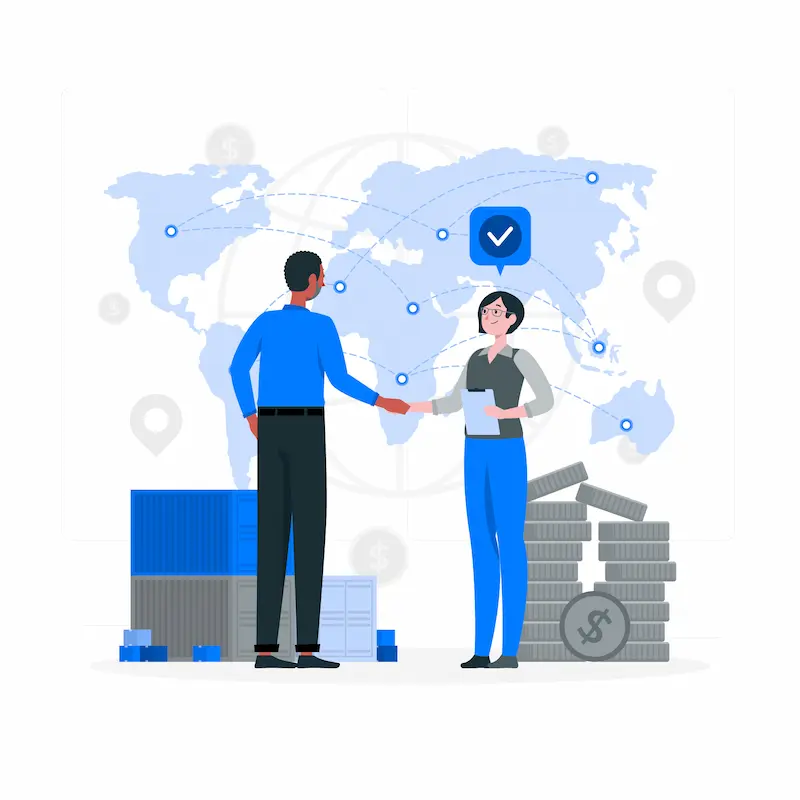
Enterprise Learning Management System solutions often include seamless integration with existing systems using open APIs. These APIs allow connectivity with third-party content providers, analytics platforms, and communication tools. For instance, organizations can incorporate content libraries from platforms like LinkedIn Learning or SkillSoft to diversify training materials.
Single Sign-On (SSO) and Human Resource Information Systems (HRIS) integration simplify user onboarding and ensure that training data aligns with HR records. E-commerce features support customer education and enable businesses to monetize training courses for partners or external clients.
By integrating these enterprise tools, organizations streamline training efforts, reduce administrative overhead, and provide a consistent and scalable training management system. These connections create a cohesive digital learning ecosystem supporting internal team member training and external customer education programs.
User Experience and Interface
User experience is a cornerstone of successful enterprise learning management. A user-friendly LMS interface drives adoption, encourages continuous learning, and engages learners. Learners who can easily navigate the system are likelier to complete courses and retain knowledge.
Modern enterprise LMS platforms emphasize clean, intuitive navigation with consistent layouts. A mobile-first design ensures accessibility across devices, making mobile learning possible from anywhere. Personalized dashboards can be customized by job role, skill level, or learning path, allowing learners to focus on relevant training content.
Accessibility features like keyboard navigation, screen reader support, and closed captions help organizations comply with industry regulations and inclusivity standards. Customizable branding ensures the learning platform reflects the organization’s identity, enhancing credibility and familiarity.
Ultimately, an easy-to-use LMS benefits both learners and administrators. It reduces training friction, improves learner progress tracking, and contributes to better business outcomes by delivering a seamless learning experience.
Further Reading: How to Create an LMS Website With WordPress
Measuring Business Impact
To evaluate the success of enterprise learning initiatives, organizations should track these key metrics:
| Metric | Why It Matters |
|---|---|
| Completion & Certification Rates | Indicates course completion and compliance adherence among learners. |
| Compliance and Effectiveness | Ensures training meets regulatory standards and delivers desired outcomes. |
| Time-to-Competency | Measures how quickly employees acquire essential skills. |
| Speed of Skill Adoption | Reflects how fast new knowledge is applied on the job. |
| Engagement Levels | Helps assess how invested learners are in their development. |
| Learner Motivation | Tracks improvements in team member performance post-training. |
| Performance Impact | Measures the overall value generated from the LMS and training programs. |
| Business Outcomes | Evaluates real-world impact such as increased sales, better customer service, or safety. |
| Cost Savings | Shows reductions in training delivery costs or operational inefficiencies. |
| Training Budgets Optimized | Ensures effective use of training investments. |
| Return on Investment (ROI) | Measures overall value generated from the LMS and training programs. |
Linking enterprise learning data with organizational KPIs clearly shows how training contributes to measurable business success.
Future Trends in Enterprise Learning Management System
The future of enterprise learning management systems is evolving rapidly. With growing demands for flexibility, engagement, and personalization, the best enterprise LMS platforms are adopting cutting-edge technologies to meet these expectations.

Here are the key trends shaping the next generation of enterprise learning:
- AI‑driven personalization: Artificial intelligence enables the learning platform to recommend customized learning paths based on job roles, skill gaps, and past performance. This boosts learner engagement and helps employees focus on what truly matters.
- Virtual and augmented reality: VR and AR create immersive environments for real-world training scenarios. This is especially effective for corporate training, technical skills, and team member onboarding.
- Microlearning: Short, focused training courses delivered in bursts make complex topics easier to absorb. Microlearning increases retention and allows employees to learn at their own pace.
- Continuous learning culture: Enterprise LMS software now integrates with business tools like Slack, Teams, and project management systems. This embeds training efforts into daily workflows, making learning management a natural part of the workday.
- Adaptive assessments: The system tailors quizzes and evaluations to each learner using real-time analytics and progress tracking. This ensures a more accurate measurement of skill development and supports data-driven learning strategies.
These innovative features are redefining enterprise learning management. As organizations shift towards scalable training, real-time reporting tools, and actionable insights, the future of online courses and training content looks more agile, intelligent, and effective than ever before.
Explore Further: Best WordPress LMS Plugins
Why Choose Seahawk for Enterprise Learning Management?
Choosing the right partner to maintain and support your enterprise learning management system is critical to ensuring long-term success. Seahawk stands out by offering comprehensive, hands-on support and ongoing optimization tailored to meet the evolving needs of enterprise businesses.

With expertise across leading LMS platforms like LearnDash and Academy LMS Pro, Seahawk helps enterprise companies deliver a seamless, secure, high-performance learning experience. Here’s how Seahawk adds value to your enterprise Learning Management System strategy:
End-to-End LMS Maintenance and Support
Seahawk takes complete ownership of the LMS lifecycle. From cloud-based LMS upkeep and routine backups to proactive site speed optimization, your training programs run efficiently, minimizing disruptions. Their 24/7 monitoring ensures uninterrupted access, enabling teams to deliver learning without technical setbacks.
Scalable and Customized LMS Solutions
Every enterprise has unique training efforts and learning strategies. Seahawk offers custom LMS solutions that scale with your needs, whether you are expanding your team member training, enhancing customer education, or introducing new e-learning courses. The solutions are designed to integrate seamlessly with existing systems, enabling better operational efficiency.
Built-in Security and Compliance Focus
Security is non-negotiable in corporate learning environments. Seahawk implements the latest protocols in SSL security, DDoS protection, and data compliance, helping your LMS meet both internal standards and external industry regulations. This ensures your training content is delivered in a protected, compliant environment through a secure learning management system.
Performance-Driven Approach
Through advanced analytics, learner progress tracking, and regular reporting functionalities, Seahawk enables you to monitor performance and extract actionable insights. Their ongoing database optimization and compatibility updates help maintain peak system performance, supporting a user-friendly and responsive learning platform.
Seamless Integration and Technical Support
Seahawk supports integration with various enterprise tools, ensuring your LMS works fluidly with your existing tools and workflows. Their dedicated account managers and Slack-based support provide real-time resolution, helping you stay ahead of any technical challenge. This fosters a reliable and scalable training management system tailored to your goals.
Expert Consultation for Strategic Growth
In addition to technical support, Seahawk provides strategic consultation for optimizing your enterprise learning management. Whether you aim to increase learner engagement, roll out custom courses, or align training materials with business objectives, their consultative approach ensures you are set up for measurable business outcomes.
Seahawk’s LMS services bridge the gap between functionality and scalability. Their proactive, enterprise-grade support ensures your corporate LMS remains aligned with evolving learning demands, giving you more time to focus on creating impactful training courses and delivering meaningful learning experiences.
Conclusion
An enterprise learning management system transforms team member training into a strategic business lever. These platforms enable scalable training and improved business results by combining course creation, mobile learning, compliance tracking, social learning, and advanced analytics.
When organizations select a user‑friendly, secure, and integrated enterprise LMS platform, they can deliver a seamless learning experience that drives operational efficiency, learner engagement, and measurable business outcomes.
Suppose your organization seeks a comprehensive LMS solution that supports corporate training, external education, and growth strategies. In that case, it is time to evaluate your needs, involve stakeholders, and select an enterprise Learning Management System platform that aligns with your learning vision.
